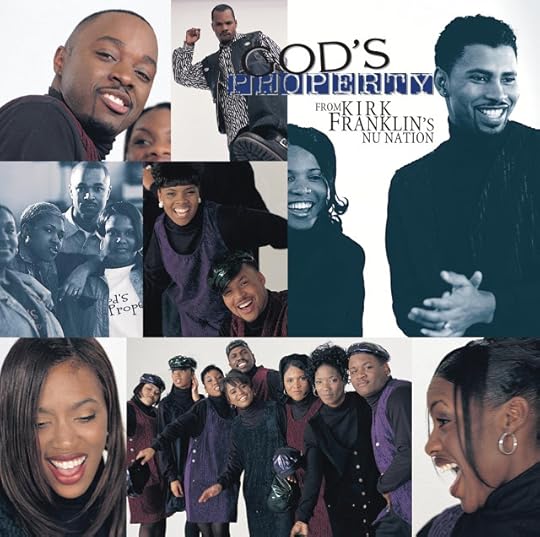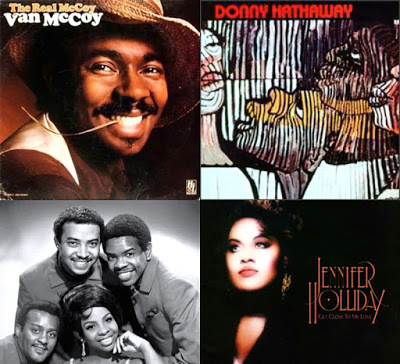Mark Anthony Neal's Blog, page 602
July 2, 2016
Betty Davis--The Columbia Years 1968-69 [Trailer]
 Light in the Attic Records
releases long-awaited recordings from Betty Davis, during her collaborative years in the late 1960s with Miles Davis--'The landmark session was produced by Miles and Teo Macero and featured Betty on vocals, accompanied by Jimi Hendrix Experience drummer Mitch Mitchell, guitarist John McLaughlin, Herbie Hancock on keys, and Dylan/Miles session bassist Harvey Brooks. Other players included bassist Billy Cox (Band of Gypsys), saxophonist Wayne Shorter, and organist Larry Young. Now, Light In The Attic, with full support from Betty herself, presents these recordings to the public for the very first time. These historic sessions—never heard, never bootlegged—predate Miles’ revolutionary album, Bitches Brew, and are the true birth of Miles’ jazz-rock explorations, along with the roots for Betty’s groundbreaking funk that came years later, starting with her self-titled debut in 1973. While, ultimately, these recordings would go unreleased for nearly half a century, they would greatly shape each of their careers.' --
Light in the Attic Records
Light in the Attic Records
releases long-awaited recordings from Betty Davis, during her collaborative years in the late 1960s with Miles Davis--'The landmark session was produced by Miles and Teo Macero and featured Betty on vocals, accompanied by Jimi Hendrix Experience drummer Mitch Mitchell, guitarist John McLaughlin, Herbie Hancock on keys, and Dylan/Miles session bassist Harvey Brooks. Other players included bassist Billy Cox (Band of Gypsys), saxophonist Wayne Shorter, and organist Larry Young. Now, Light In The Attic, with full support from Betty herself, presents these recordings to the public for the very first time. These historic sessions—never heard, never bootlegged—predate Miles’ revolutionary album, Bitches Brew, and are the true birth of Miles’ jazz-rock explorations, along with the roots for Betty’s groundbreaking funk that came years later, starting with her self-titled debut in 1973. While, ultimately, these recordings would go unreleased for nearly half a century, they would greatly shape each of their careers.' --
Light in the Attic Records
Published on July 02, 2016 04:26
July 1, 2016
Tiny Desk Concert: Adia Victoria
 'Adia Victoria's voice is powerful and direct, with no artifice; it carries the singular perspective of a Southern black woman with a Seventh Day Adventist upbringing, who never felt like she'd fit in' says
NPR's
Bob Boilen in his introduction to the singer's
Tiny Desk Concert
. Victoria recently released her first album Beyond The Bloodhounds.'
'Adia Victoria's voice is powerful and direct, with no artifice; it carries the singular perspective of a Southern black woman with a Seventh Day Adventist upbringing, who never felt like she'd fit in' says
NPR's
Bob Boilen in his introduction to the singer's
Tiny Desk Concert
. Victoria recently released her first album Beyond The Bloodhounds.'
Published on July 01, 2016 20:56
How the Economic Crash + Income Inequality Wrecked US Politics
 'Disagreements over income inequality are always present in democracies, but at times the topic submerges. Today, the topic has reemerged and is driving the next presidential election. Sean Wilentz's new book is
The Politicians and the Egalitarians: The Hidden History of American Politics
.'
'Disagreements over income inequality are always present in democracies, but at times the topic submerges. Today, the topic has reemerged and is driving the next presidential election. Sean Wilentz's new book is
The Politicians and the Egalitarians: The Hidden History of American Politics
.'
Published on July 01, 2016 20:47
#TheSpin: Supreme Court Flips Texas Anti-Abortion Law
 On this episode of
#TheSpin
with host Esther Armah, contributors Sofia Quintero and asha bandele discuss The Supreme Court ruling on a Texas Abortion Law and Jesse Williams' speech at the BET Awards.
On this episode of
#TheSpin
with host Esther Armah, contributors Sofia Quintero and asha bandele discuss The Supreme Court ruling on a Texas Abortion Law and Jesse Williams' speech at the BET Awards.
Published on July 01, 2016 20:38
A Gender Primer for Stephen A. Smith + Sports Talk Nation by Stephane Dunn
 A Gender Primer for Stephen A. Smith + Sports Talk Nationby Stephane Dunn | @DrStephaneDunn | NewBlackMan (in Exile)
A Gender Primer for Stephen A. Smith + Sports Talk Nationby Stephane Dunn | @DrStephaneDunn | NewBlackMan (in Exile)“. . . Sorry this is absolutely rigged for money. . . Or ratings . . . I won’t be silent.” -- Ayesha Curry on Twitter
The finals are over. Lebron and the Cavs are in the annals of great sports history and in the after glow, a lot of the drama that defined the 2016 finals is already receding from cultural memory. But the Stephen A Smith - Ayesha Curry tweet duel is way too instructive to be lost in the shadow of an epic finals series and filed away. It perfectly highlighted the ongoing gender politics integral to American sports. Smith embodies contemporary sports media to a tee where a guy’s tell-it-like-I-see-it mouthiness, word play skills, or incredible nerviness can get nicely rewarded with a fat contract from ESPN and celebrity status.
Smith had been there before we know–catching public heat over his inappropriate gendered commentaries. In his 2014 public musings about the Ray Rice abuse scandal, Smith suggested that the responsibility for not ending up knocked out in an elevator was partly on the woman to not provoke unjustifiable abuse in the first place. Women skewered him publicly and ESPN was forced to slap one of its favorite sons on the wrist.
Following Ayesha Curry’s post Game 6 tweet, he schooled her for talking aloud and too much about her husband’s job instead of being a good, quiet trophy wife and egregiously did so by focusing on Curry and Savannah James's looks and differing demeanors:
As beautiful as everyone wants to say Ayesha Curry is, and she is, Savannah is something special. I’m here to tell you something right now. Ain’t a man alive, particularly a black man, that’s going to look at LeBron James’s wife and not say that that woman ain’t gorgeous. Well, she’s wonderful inside and out. She sits there. She doesn’t bring any attention to herself. She never tweets and goes out there and calls out the league and stuff like that. And nobody, nobody is more scrutinized than her husband.
Clearly, Smith could use a basic gender primer to temper what’s threatening to become a bona fide pattern:
* Women’s looks should not be the focus of sports reporting and commentating. It's actually possible to critique their words and their play, if athletes, without mixing in personalized comments about how pretty you think they are or aren't.
* Comparing women’s physical attributes or estimating their wifely worthiness is a no all the time.
* Before commentating publicly about any sensitive matters that come up in sports nation, say rape or domestic violence, check and deconstruct your male privilege then comment publicly if done successfully. If not, better to take note, analyze, and not speak.
And yet, despite his notable gender blunders, Smith shouldn't be tagged as the face of sexism in sports media. Smith was the standout of a moment [again], but he was manifesting the long-standing nature of men's sports talk. Remember morning radio host Don Imus in 2007? Imus called the ladies of the Rutgers basketball team "nappy headed hos" putting on full display how deeply sexist [and racist] commentary flows along with sports chatter.
Drive along listening to sports radio shows regularly as I do and you’ll discover that women's looks come up pretty frequently – be they athletes or the significant other or date of an athlete or just someone who makes the news of the day, say just by being captured on camera cheering at a game. Too often male hosts offer their extra 'expertise’ like self-appointed beauty contest judges and casually deem the woman of focus a ‘dog’ or a beauty thereby validating their heterosexual masculine sports cred. Why do they presume to be the beholders of beauty for listeners and use their public professional platforms as if they’re at home watching a game, kicking back and talking smack with their closest guy crew? Unchecked Male privilege.
Whether it’s Steph Curry’s mom or his wife, Lebron’s wife, or the girlfriend of a college athlete, Serena Williams or another female athlete, women’s looks become fodder to be discussed and dissected as freely as a game. That’s the true patriarchal nature of American sports culture. It’s reinforced on guy=beer=girl commercials during the big televised football or basketball games and during those same games as the women by and large ‘work’ on their feet on the sidelines or on the margins of the field while the ‘real’ sports guy experts sit literally on high in their best suits. Smith even had the nerve to put Savannah James in the mess when she has exercised her right not to be on social media letting it all hang out.
In a world where we have 24-7 access to be public and many of us are, we can get dangerously close to presuming that not weighing in on social media is the equivalent of being silent, of not having a voice. But social media need not be selected the sole primary or legitimate way to speak; the choice to not speak via social media should not be read as passivity or silence – or the measure of being a ‘good’ person, woman or wife or not.
But of course, Smith thought nothing of interrogating Ayesha Curry's ‘rigged’ game charge - which was okay to interrogate – by contrasting her to Savannah James and evaluating their value in terms of several qualities that traditional American sexism historically favors for measuring ‘true’ respectable womanhood –supposed heterosexual attractiveness, respectable behavior, and adherence to the gender status quo.
Evaluating women in terms of their bodies, perceived level of physical beauty, or how they choose to wear their roles as romantic or life partners is as tacky and outdated as half-naked, ad-carrying girls in the ring at a boxing match.
Yeah, I said it. You may tweet me.
Perhaps Stephen A. and colleagues could meditate on that before picking up the mike.
+++
Stephane Dunn is a writer and professor at Morehouse College. Publications, include the 2008 book Baad Bitches & Sassy Supermamas: Black Power Action Films (U of Illinois) and a number of articles in mediums such as Ebony.com, The Atlantic, The Root.com, the AJC, and others.
Published on July 01, 2016 06:42
Stomping Into the Future of Gospel Music
 Stomping Into the Future of Gospel Musicby Marcus McCullough | NewBlackMan (in Exile)
Stomping Into the Future of Gospel Musicby Marcus McCullough | NewBlackMan (in Exile)The after-party was in full effect in the spring of 1997, following my big brother’s honoree ball. But when the song changed an interesting scene followed. The new song was technically a gospel song—but unless you knew that you may have mistaken the genre. After all, the bass line was funky, the beat was fresh, and the song could be heard in the regular rotation on the local hip-hop/top 40 radio station. Unsurprisingly then, some of the young men and women who were dancing continued to—let’s say “grind”—on each other, as if they were dancing to yet another “secular” song.
As a number of the teenagers present, including my brother, looked appallingly at this, someone firmly reminded the dancing teens that, since this was a gospel song, such “freak dancing” was inappropriate. The grinding eventually stopped and everyone went back to the awkward, shy dancing that teenagers do when they try to behave. However, some in the room still decried these more innocent dance moves as too “secular” or “worldly” for that kind of song.
And so it began: the awkward, confusing, mixed responses to this “gospel” song that sounded “worldly” and was played on “secular” radio.
That song: “Stomp” (Remix) by Kirk Franklin and God’s Property.
The bass line (liberally borrowed from Funkadelic’s “One Nation Under a Groove”); the rap verse from Cheryl James, better known as “Salt” from 90s female rap group Salt-N-Pepa; and its popularity on “secular” radio are but a few reasons why this now-classic gospel song was as groundbreaking—and divisive—as it was. The track sparked conversation and conflict among Black Christians: some hated the song because it sounded too “worldly” while others loved it for that very reason, particularly since they believed it could potentially win souls for Christ.
Thus conversations about the Gospel and “appropriate” versus “inappropriate” ways to spread it abounded. These sometimes got emotional, even hostile, as some viewed such music as a threat to the Gospel and a watering down of gospel music. Some even considered the music to be pure evil, a new foray for Satan into the minds and hearts of the saints.
Lost in all of this humdrum is the beauty of the album containing this song, God’s Property. One might say today that nobody really makes albums anymore, rather artists merely record a bunch of songs with no rhyme or reason behind the compilation. I might agree.
Insert God’s Property into the CD player—yes, the CD player.
Though “Stomp” is the opening track, you would immediately thereafter realize that you have encountered a true gospel album. Track 2, “My Life Is In Your Hands,” is the kind of slow, devotional, emotion-stirring song that exemplifies the trust and hope that is the core of gospel music. Similarly, tracks 11 and 13, “The Storm Is Over Now” and “He Will Take the Pain Away,” respectively, exemplify hope and encouragement and may even produce an embodied emotional response. Track 4, “More Than I Can Bear,” exemplifies much of the same with the added touch of riffs from a Hammond organ, a staple in many Black churches.
On and on, track by track by track, it becomes clear that this album is very much rooted in the gospel music tradition while also demonstrating engagement with more contemporary, “worldly” sounds. Perhaps this is most evident on track 9, “You Are the Only One,” where Kirk Franklin features an old school preacher in mid-sermon energetic form while the choir sings “partay fo’ Jesus.” As an album—an intentionally-crafted work of artistry and track placement—it likely surprised a few people, particularly those who may have purchased the album expecting everything to sound like “Stomp.” And what a good, and seminal, surprise it was.
This is the artistic beauty of God’s Property as well as of Kirk Franklin’s genius: new sounds interspersed between more traditional “gospel” sounds in an unobtrusive, inoffensive way. This is intentional, as Kirk stated before bringing on the old-school preacher on the aforementioned track, that we cannot get “caught up on all this new stuff” and must not forget where we came from. Thus this “too secular” or “too worldly” gospel artist paid sincere homage to the tradition while including “secular” references.
Here, then, is more than a conversation—here is a harmony of two different eras of gospel sound done in a special way. This album takes listeners through gospel’s past and present while ushering in its future. Here is a different kind of bridge over a different kind of troubled water.
We cannot overlook how monumental this was. Today with gospel artists and groups like Mary Mary, Tye Tribbett, Tonex, the expansion of Christian hip-hop, and up-and-coming artists like Chance the Rapper blurring the lines some thought firmly demarcated, we may forget that such “secularized” gospel was not the norm, let alone with such a healthy incorporation of traditional flavor. We now tend to take new-age gospel for granted such that any “secular”-sounding gospel song rarely garners attention, except Erica Campbell’s “trap gospel” track, “I Luh God.” Indeed, it is a gift that gospel music keeps evolving in ways that keep the Gospel fresh for new and younger ears.
Still, we must acknowledge that without “Stomp” (Remix) and the album God’s Property, much of this foundation may have never been laid. For this and other reasons, I consider Kirk Franklin to be the greatest (gospel) artist of this generation and God’s Property to be one of the greatest (gospel) albums I’ve ever heard.
+++
Marcus McCullough is a lifelong member of the AME Church. He holds degrees from Boston University School of Theology, Harvard Divinity School, and Morehouse College. He serves as pastor of Bethel AME Church, Lowell, MA.
Published on July 01, 2016 05:39
June 29, 2016
Curator Michal Raz-Russo on 'Invisible Man: Gordon Parks + Ralph Ellison in Harlem'
 'Curator Michal Raz-Russo provides an overview of the exhibition '
Invisible Man: Gordon Parks + Ralph Ellison in Harlem
' which reunites for the first time the surviving photographs and texts intended for the two collaborations between Gordon Parks and Ralph Ellison. Included in the exhibition are never-before-seen photographs by Parks from the collections of the Art Institute and the Gordon Parks Foundation and unpublished manuscripts by Ellison.' --
The Art Institute of Chicago
'Curator Michal Raz-Russo provides an overview of the exhibition '
Invisible Man: Gordon Parks + Ralph Ellison in Harlem
' which reunites for the first time the surviving photographs and texts intended for the two collaborations between Gordon Parks and Ralph Ellison. Included in the exhibition are never-before-seen photographs by Parks from the collections of the Art Institute and the Gordon Parks Foundation and unpublished manuscripts by Ellison.' --
The Art Institute of Chicago
Published on June 29, 2016 14:20
Your Parents' Hip-Hop: A Conversation with 9th Wonder
 Photo Credit: Creative SilenceWUNC's Frank Stasio talks with Grammy Award Winning Producer and Jamla Records label head Patrick Douthit aka 9th Wonder about the pivotal moments in Hip-Hop and how the music shapes other elements of life, from fashion to social activism. This summer Douthit is offering "
Hip-Hop in Context,
" a 5-part lecture series at North Carolina State University. For the past six years Douthit has co-taught the popular
History of Hip-Hop
course at Duke University with Mark Anthony Neal.
Photo Credit: Creative SilenceWUNC's Frank Stasio talks with Grammy Award Winning Producer and Jamla Records label head Patrick Douthit aka 9th Wonder about the pivotal moments in Hip-Hop and how the music shapes other elements of life, from fashion to social activism. This summer Douthit is offering "
Hip-Hop in Context,
" a 5-part lecture series at North Carolina State University. For the past six years Douthit has co-taught the popular
History of Hip-Hop
course at Duke University with Mark Anthony Neal.
Published on June 29, 2016 13:47
June 28, 2016
#UnderTheSoulCovers:“Giving Up”--Donny Hathaway + Gladys Knight & The Pips+ Jennifer Holliday
 #UnderTheSoulCovers:“Giving Up”--Donny Hathaway + Gladys Knight & The Pips+ Jennifer Hollidayby Mark Anthony Neal | @NewBlackMan | NewBlackMan (in Exile)
#UnderTheSoulCovers:“Giving Up”--Donny Hathaway + Gladys Knight & The Pips+ Jennifer Hollidayby Mark Anthony Neal | @NewBlackMan | NewBlackMan (in Exile)“Giving Up,” a song written by Van McCoy--the same McCoy who would give us “The Hustle” in the mid 1970s -- is the opening track of Donny Hathaway’s self-titled second studio album. There’s no question that song set the tone for what is the nearly perfect opening side of the album. Though “Giving Up’ is legitimately Hathaway’s song, it was actually recorded by Gladys Knight & the Pips as a stand-alone single in 1964, a few years before the quartet signed with Motown and began their run of commercial success. The earliest version of “Giving Up” bears little resemblance to the Hathaway version, as is also the case with the McCoy produced Ad-Libs version that appears in 1969. When Jennifer Holliday recorded “Giving Up” as the closing track to her 1987 album Get Close to My Love, she clearly had Hathaway’s version in mind, and given the power of her voice, offers a fitting tribute to Hathway and the late McCoy. Holliday’s version of “Giving Up,” arguably outshines her career defining star-turn on the Dreamgirls soundtrack, with “And I’m Telling You.”
Published on June 28, 2016 16:39
"Maiysha (So Long)" Extended Version -- Miles Davis + Robert Glasper feat Erykah Badu
 Sonics + Visuals for "Maiysha (So Long)" from Everything's Beautiful, Robert Glasper's meditation on Miles Davis, which features vocals from Erykah Badu.
Sonics + Visuals for "Maiysha (So Long)" from Everything's Beautiful, Robert Glasper's meditation on Miles Davis, which features vocals from Erykah Badu.
Published on June 28, 2016 06:10
Mark Anthony Neal's Blog
- Mark Anthony Neal's profile
- 30 followers
Mark Anthony Neal isn't a Goodreads Author
(yet),
but they
do have a blog,
so here are some recent posts imported from
their feed.



